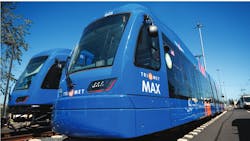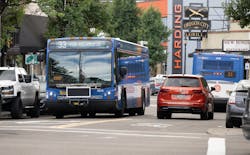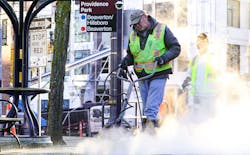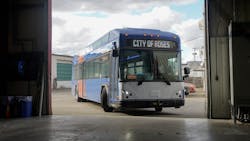TriMet proposes $1.75 billion FY25 budget
TriMet has proposed its $1.75 billion Fiscal Year (FY) 2025 budget, which the agency says provides the financial framework to grow ridership, improve the customer experience and add service as staffing allows. The budget includes nearly $849 million for daily operations, $201 million for capital investments and about $58 million in pass-through and contingency funds. It also includes $642 million in ending fund balance totals, which are unappropriated and unavailable for spending in FY25. The budget begins on July 1, 2024, and runs through June 30, 2025.
About 91 percent of funding for FY25 operating resources comes from three sources:
- Payroll tax revenues
- Passenger revenues
- Federal funds
For FY25, TriMet expects to receive about $540 million in payroll taxes, $62 million in passenger fares and about $139 million from federal operating grants. TriMet will also receive a small portion of the FY25 funding from accessible transportation and service contracts and advertising. The FY25 budget includes the first full year of revenues from the agency’s 2024 fare increase.
Transit service
The proposed FY25 budget focuses on providing exceptional transit service and proposes service improvements guided by TriMet’s Forward Together service concept. In addition to continuing to run a robust network of buses and trains across the agency’s 533-square mile service district, in FY25, TriMet would like to:
- Add four new Frequent Service bus lines
- Add new bus lines in East Portland, Sellwood and West Linn
- Extend service in East Multnomah County and I-205 between Tualatin and Oregon City
- Add more buses to well-used lines that do not currently have Frequent Service
- Continue to streamline routes and discontinue service with less ridership and demand
TriMet notes its service improvement and expansion plans must be supported by the appropriate staffing levels to be successful and sustainable. Hiring and training additional operators and maintenance staff will continue to be an important emphasis in FY25, as will efforts to increase retention of both new and long-time employees.
The FY25 budget includes more resources for ongoing spot cleaning, deep cleaning, graffiti cleanup and aesthetic repairs that make the TriMet system feel more desirable and welcoming overall.
Safety and security
TriMet says the proposed Safety and Security budget for FY25 is quadruple what it was in FY22. TriMet more than doubled the number of security personnel on its transit system in the last year, as the agency continues to adopt a comprehensive and layered approach to safety and security. Currently, there are more than 350 unarmed security personnel providing presence, assistance and resources to riders – more than ever before. Among them is the agency’s Safety Response Team, whose members carry Narcan, a life-saving, Food and Drug Administration-approved nasal spray that can reverse the effects of an opioid overdose. The Safety Response Team, increased personnel and several other efforts were the result of TriMet’s Reimagining Public Safety on Transit initiatives, which grew out of the social justice movement of 2020. In addition to the increased presence on board the agency’s buses, trains and across the transit system, TriMet has established a Safety Operations Center, which helps coordinate the agency’s response to non-emergency security concerns that occur on its system.
Capital investments
TriMet plans to complete A Better Red in FY25, a project that brought more than $100 million in federal investments to the Portland, Ore., region, creating jobs and modernizing the agency’s light-rail system to create a better experience for all riders. The project, set for completion in late August, has already improved train movement at key sections of the system near Portland International Airport and Gateway Transit Center. It will also extend the MAX Red Line an additional 10 stations into Hillsboro, helping to provide more capacity in a growing job center of Washington County. TriMet has also replaced its oldest light rail vehicles with its new Type 6 models, expanding the SE Park Avenue Park & Ride as originally planned and developing its Columbia Operations Facility, which is pivotal for testing and expansion of the agency’s Zero-Emissions Bus Program.
Climate action
TriMet is continuing its transition to a zero-emissions bus fleet, with the expansion of electric bus charging infrastructure at its Merlo and Powell Operations facilities. TriMet currently has received the first four of 24 third-generation GILLIG zero-emissions buses. When the delivery is complete, TriMet will have 34 battery-electric buses operating throughout its transit system, making up about five percent of its total bus fleet. In FY25, TriMet will continue to build capacity for its goal to transition to a full zero-emissions fixed-route fleet by 2040.




